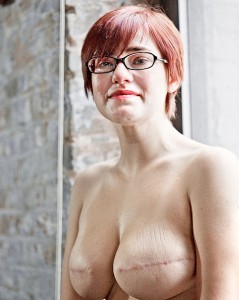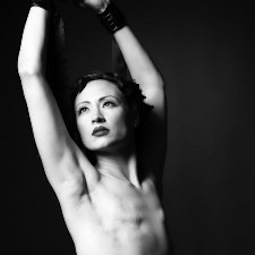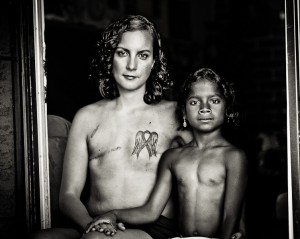Dear Mark and Facebook moderators,
I am writing to you about the SCAR Project, a Pulitzer Prize-nominated project that seeks to put a face on breast cancer and the young women affected by the disease. The SCAR Project and its striking images of women who have undergone mastectomies, most in their 20s and 30s, have been featured in LIFE, Forbes, Psychology Today, The Wall Street Journal, The Huffington Post, AOL, and The Lancet. But they are no longer permitted on Facebook.
In 2007, before the world knew about the SCAR Project, I modeled for the project’s photographer, David Jay. My reason for posing was simple: I never wanted another woman who was facing a mastectomy to wonder—wonder what she would look like, wonder if she would still be herself, wonder if she would survive. Before I had a prophylactic mastectomy in January of 2007, I searched high and low on the internet and could find no photographs of what I could expect. Everything I found was geared toward older women. No one looked like me, and I was terrified.
Never in my wildest dreams did I imagine the SCAR Project would become a global influence that would reach and touch so many women. When I read the comments of the women who are appreciative to finally see someone else like them, who say the photographs gave them the strength, peace, and comfort to grapple with their own ordeal, I am overwhelmed. Because my hope has been realized tenfold.
How did this project gain momentum? I have to believe that it is in large part because of Facebook. The project’s first exhibition was in NYC in 2010. At that time, I remember the SCAR Project's Facebook page followers numbered in the four figures. Today, as I am typing, the page has over 22,000 followers.
 But now, the project’s impact and its ability to reach such a widening audience of women is at risk—also because of Facebook. The SCAR Project has received multiple warnings about its content from Facebook’s moderators. At this point, David Jay has decided to remove the photographs rather than risk the page being shut down.
But now, the project’s impact and its ability to reach such a widening audience of women is at risk—also because of Facebook. The SCAR Project has received multiple warnings about its content from Facebook’s moderators. At this point, David Jay has decided to remove the photographs rather than risk the page being shut down.
I am writing to ask you to please step in. I truly believe, Mark, you must know someone who has been affected by breast cancer. (Unfortunately, the days of not knowing someone changed by breast cancer are long gone.)
Think of the person you know—maybe she’s a relative, maybe a friend. Consider how she must feel, having to cut off a body part—and the body part society tells her is the most important part of being a woman. Imagine her isolation, her fear, her grief, her anger—coupled with the feeling that she’s alone in her experience.
The SCAR Project has changed all of this. It has allowed women faced with breast cancer to see their strength, to find their beauty in this strength. In order for the SCAR Project to continue helping these women, the photographs need to be made available.
Please, take a moment to look at the SCAR Project's Facebook page. Read the comments. There is no denying the power and impact it’s having on the people who view the photographs.
Then, take a look at the SCAR Project's website to see the actual photographs. There is nothing sexual. But there’s something powerful: It’s showing the world that breast cancer is, and always has been, so much more than a pink ribbon.
Thank you for your time and consideration.
Sara



